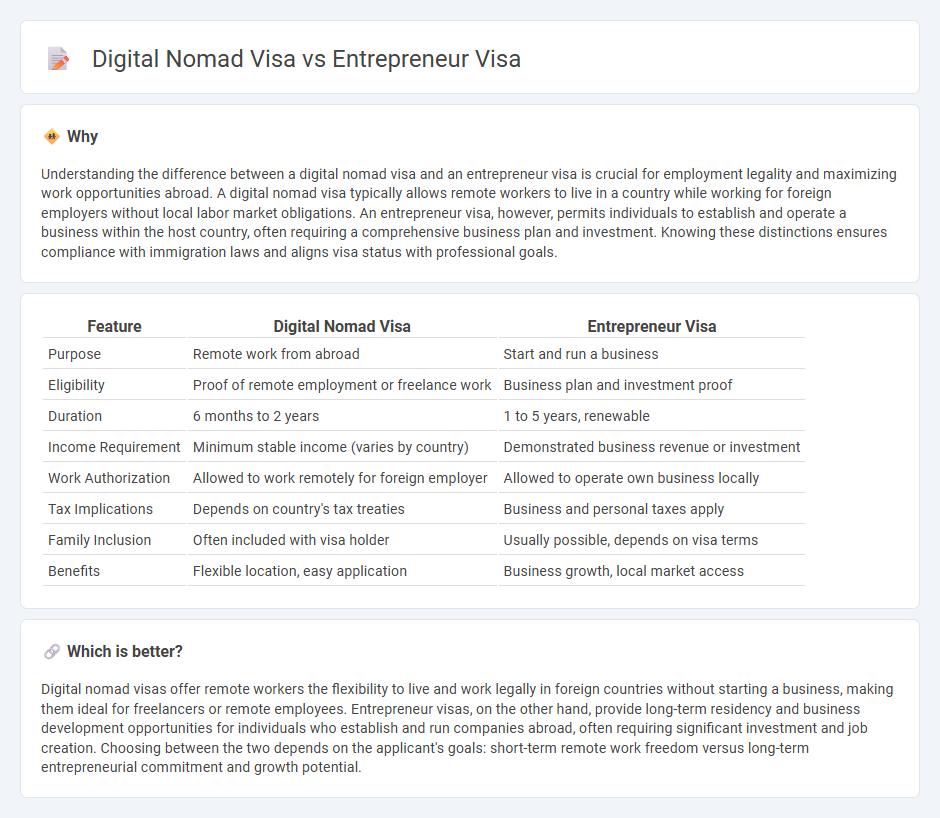
Digital nomad visas enable remote workers to live and work legally in a foreign country without seeking local employment, focusing on flexibility and location independence. Entrepreneur visas target business founders aiming to establish or run companies abroad, often requiring a viable business plan and investment proof. Explore the differences to determine which visa aligns with your career goals and lifestyle.
Why it is important
Understanding the difference between a digital nomad visa and an entrepreneur visa is crucial for employment legality and maximizing work opportunities abroad. A digital nomad visa typically allows remote workers to live in a country while working for foreign employers without local labor market obligations. An entrepreneur visa, however, permits individuals to establish and operate a business within the host country, often requiring a comprehensive business plan and investment. Knowing these distinctions ensures compliance with immigration laws and aligns visa status with professional goals.
Comparison Table
| Feature | Digital Nomad Visa | Entrepreneur Visa |
|---|---|---|
| Purpose | Remote work from abroad | Start and run a business |
| Eligibility | Proof of remote employment or freelance work | Business plan and investment proof |
| Duration | 6 months to 2 years | 1 to 5 years, renewable |
| Income Requirement | Minimum stable income (varies by country) | Demonstrated business revenue or investment |
| Work Authorization | Allowed to work remotely for foreign employer | Allowed to operate own business locally |
| Tax Implications | Depends on country's tax treaties | Business and personal taxes apply |
| Family Inclusion | Often included with visa holder | Usually possible, depends on visa terms |
| Benefits | Flexible location, easy application | Business growth, local market access |
Which is better?
Digital nomad visas offer remote workers the flexibility to live and work legally in foreign countries without starting a business, making them ideal for freelancers or remote employees. Entrepreneur visas, on the other hand, provide long-term residency and business development opportunities for individuals who establish and run companies abroad, often requiring significant investment and job creation. Choosing between the two depends on the applicant's goals: short-term remote work freedom versus long-term entrepreneurial commitment and growth potential.
Connection
The digital nomad visa and entrepreneur visa both facilitate employment opportunities by enabling remote work and business establishment in foreign countries. Digital nomad visas primarily target individuals working remotely for companies abroad, while entrepreneur visas allow founders to start and operate businesses within the host nation. These visas collectively support global workforce mobility and foster economic growth through innovation and international collaboration.
Key Terms
Business Ownership
Entrepreneur visas typically require proof of active business ownership with plans for growth and economic contribution, whereas digital nomad visas allow remote work without direct local business involvement. Entrepreneur visa holders often face stricter regulations, such as minimum investment and job creation criteria, while digital nomads benefit from flexible residency focused on work location independence. Explore comprehensive comparisons to determine which visa aligns best with your long-term business goals and lifestyle.
Remote Work
Entrepreneur visas typically require establishing or investing in a business within the host country, while digital nomad visas prioritize remote work flexibility without the need for local business activities. Remote workers benefit from digital nomad visas as they allow professionals to legally reside and work from a foreign country without affecting their employment status elsewhere. Explore the specific visa requirements and advantages to determine the best option for your remote work lifestyle.
Residency Requirements
Entrepreneur visas generally demand substantial investment, business plans, and proof of job creation or economic contribution, often requiring physical residency or regular presence in the host country. Digital nomad visas prioritize remote work flexibility with minimal residency obligations, typically allowing holders to live abroad while maintaining their foreign employment. Explore detailed criteria and options to determine the best visa for your residency and business goals.
Source and External Links
Entrepreneur visa (Spain) - This visa is for foreigners moving to Spain to carry out innovative entrepreneurial activities of particular economic interest, requiring a favorable project report, proof of financial means, and a criminal record check, among other documents.
Self-employment visa - Entrepreneur visas are usually temporary permits that may lead to permanent residency based on the economic interest and success of the entrepreneur's business, with criteria varying by country, including required capital and individual profile.
Start-up Visa Program - Canada.ca - Canada's Start-up Visa Program targets immigrant entrepreneurs with innovative businesses able to create jobs, requiring support from designated organizations, language proficiency, and sufficient settlement funds.
 dowidth.com
dowidth.com